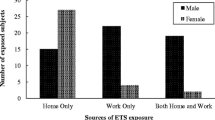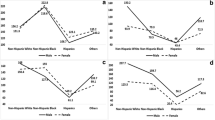Objectives: Although widely used in epidemiological studies, self-report has been shown to underestimate the prevalence of smoking among pregnant women. Objectives of this study were to examine the discrepancy between self-reported and cotinine-validated smoking status, and the sociodemographic characteristics associated with the misclassification of real smoking status among pregnant women in Tallinn, the capital of Estonia. Methods: Serum cotinine assays were performed on a subsample (n= 1360) of the pregnant women, who had participated in a recent study of human papillomavirus type 16 (HPV-16) seroprevalence in Estonia. In the present study, serum concentrations ≥15 ng/ml were used to distinguish current smokers from nonsmokers. The serum-validated smoking level was compared with the self-reported level in the records of the Estonian Medical Birth Registry. For the group of self-reported non-smokers, the differences between the cotinine-validated smokers and the cotinine-validated nonsmokers, with respect to their sociodemographic characteristics (age, ethnicity, educational level, employment status, marital status, parity), were estimated by logistic regression. Results: Of 1239 women who reported being nonsmokers, 259 (20.9%) had serum cotinine levels ≥15 ng/ml, and can be regarded as current smokers. Among self-reported nonsmokers, nondisclosure of current smoking was significantly more frequent in non-Estonian, less educated, socially inactive, cohabiting and multiparous women. Conclusions: Self-reported data on smoking in pregnant women underestimates the real smoking prevalence in Estonia. Maternal unwillingness to declare smoking during pregnancy needs to be taken into account in the practice of maternal and child health to better target prenatal smoking cessation interventions.
Similar content being viewed by others
REFERENCES
Walsh RA, Redman S, Brinsmead MW, Byrne JM, Melmeth A. A smoking cessation program at a public antenatal clinic. Am J Public Health 1997;87:1201–4.
Boyd NR, Windsor RA, Perkins LL, Lowe JB. Quality of measurement of smoking status by self-report and saliva cotinine among pregnant women. Matern Child Health J 1998;2:77–83.
Mathews F, Smith R, Yukdin P, Neil A. Are cotinine assays of value in predicting adverse pregnancy outcome? Ann Clin Biochem 1999;36:468–76.
Klebanoff MA, Levine RJ, Morris CD, Hauth JC, Sibai BM, Ben Curet L, Catalano P, Wilkins DG. Accuracy of self-reported cigarette smoking among pregnant women in the 1990s. Paediatr Perinat Epidemiol 2001;15:140–3.
Schluter PJ, Ford RP, Ford CJ. A biochemical prevalence study of smoking in pregnancy for a cross-section of women in Christchurch, New Zealand. Aust N Z J Public Health 2002;26:231–5.
Floyd RL, Rimer BK, Giovino GA, Mullen PD, Sullivan SE. A review of smoking in pregnancy: Effects on pregnancy outcomes and cessation efforts. Annu Rev Public Health 1993;14:379–411.
Pichini S, Basagana XB, Pacifici R, Garcia O, Puig C, Vall O, Harris J, Zuccaro P, Segura J, Sunyer J. Cord serum cotinine as a biomarker of fetal exposure to cigarette smoke at the end of pregnancy. Environ Health Perspect 2000;108:1079–83.
Lawrence T, Aveyard P, Croghan E. What happens to women's self-reported cigarette consumption and urinary cotinine levels in pregnancy? Addiction 2003;98:1315–20.
Salihu HM, Aliyu MH, Pierre-Louis BJ, Alexander GR. Levels of excess infant deaths attributable to maternal smoking during pregnancy in the United States. Matern Child Health J 2003;7:219–27.
Ford RP, Tappin DM, Schluter PJ, Wild CJ. Smoking during pregnancy: How reliable are maternal self reports in New Zealand? J Epidemiol Community Health 1997;51:246–51.
Statistikaamet. Statistical Office of Estonia. Eesti statistika aastaraamat 1997. Statistical yearbook of Estonia 1997. Tallinn, 1997.
Puska P. Smoking in central & eastern Europe. In: Waller M, Lipponen S, editors. Smokefree Europe. A Forum for Networks. Jyväskylä: Finnish Centre for Health Promotion, 1997; pp. 138–43.
Lipand A, Kasmel A, Kivilo M, Tasa E, Puska P, Berg M-A, Peltoniemi J. Eesti täiskasvanud elanikkonna terviseuurimus 1990. a. kevadel. Health behavior among Estonian adult population, spring 1990. Helsinki: National Public Health Institute, 1992.
Kasmel A, Lipand A, Kasmel K, Traat U, Markina A, Uutela A, Helakorpi S, Puska P. Eesti täiskasvanud elanikkonna tervisekäitumise uuring, kevad 1996. Health behavior among Estonian adult population, spring 1996. Helsinki: National Public Health Institute, 1997.
Tellmann A, Karro H, Serkina V. Eesti Meditsiiniline Sünniregister 1992–1999. Eesti Abordiregister 1996–1999. Estonian Medical Birth Registry 1992–1999. Estonian Abortion Registry 1996–1999. Tallinn 2001.
Karro H, Rahu M, Gornoi K, Baburin A. Estonian medical birth registry 1992–1994: Association of risk factors with perinatal mortality. Eur J Obstet Gynecol 1998;80:151–6.
Lipand A, Kasmel A, Tasa E, Leinsalu M, Uutela A, Puska P, Helakorpi S. Eesti täiskasvanud elanikkonna terviseuuring, kevad 1994. Health behavior among Estonian adult population, spring 1994. Helsinki: National Public Health Institute, 1995.
English PB, Eskenazi B, Christianson RE. Black-white differences in serum cotinine levels among pregnant women and subsequent effects on infant birthweight. Am J Public Health 1994;84:1439–43.
Eskenazi B, Prehn AW, Christianson RE. Passive and active maternal smoking as measured by serum cotinine: The effect on birthweight. Am J Public Health 1995;85:395–8.
Suadicani P, Hein HO, Gyntelberg F. Mortality and morbidity of potentially misclassified smokers. Int J Epidemiol 1997;26:321–7.
Caraballo RS, Giovino GA, Pechacek TF, Mowery PD, Richter PA, Strauss WJ, Sharo DJ, Eriksen MP, Pirkle JL, Maurer KR. Racial and ethnic differences in serum cotinine levels of cigarette smokers: Third National Health and Nutrition Examination Survey, 1988-1991. JAMA 1998;280:135–9.
Heller WD, Scherer G, Sennewald E, Adlkofer F. Misclassification of smoking in a follow-up population study in southern Germany. J Clin Epidemiol 1998;51:211–8.
Wells AJ, English PB, Posner SF, Wagenknecht LE, Perez-Stable EJ. Misclassification rates for current smokers misclassified as nonsmokers. Am J Public Health 1998;88:1503–9.
Kaufman FL, Kharrazi M, DeLorenze GN, Eskenazi B, Bernert JT. Estimation of environmental tobacco smoke exposure during pregnancy using a single question on household smokers versus serum cotinine. J Expo Anal Environ Epidemiol 2002;12:286–95.
Lain KY, Powers RW, Krohn MA, Ness RB, Crombleholme WR, Roberts JM. Urinary cotinine concentration confirms the reduced risk of preeclampsia with tobacco exposure. Am J Obstet Gynecol 1999;181:1192–6.
Centers for Disease Control and Prevention. Second national report on human exposure to environmental chemicals. Atlanta: Centers for Disease Control and Prevention, National Center for Environmental Health, 2003. NCEH Pub No 02–0716.
Benowitz NL. Biomarkers of environmental tobacco smoke exposure. Environ Health Perspect 1999;107:349–55.
Rebagliato M. Validation of self reported smoking. J Epidemiol Community Health 2002;56:163–4.
Kibur M, Koskela P, Dillner J, Leinikki P, Saikku P, Lehtinen M, Hakama M. Seropositivity to multiple sexually transmitted infections is not common. Sex Transm Dis 2000;27:425–30.
Peacock JL, Cook DG, Carey IM, Jarvis MJ, Bryant AE, Anderson HR, Bland JM. Maternal cotinine level during pregnancy and birthweight for gestational age. Int J Epidemiol 1998;27:647–56.
Markovic N, Ness RB, Cefilli D, Grisso JA, Stahmer S, Shaw LM. Substance use measures among women in early pregnancy. Am J Obstet Gynecol 2000;183:627–32.
Owen L, McNeill A. Saliva cotinine as indicator of cigarette smoking in pregnant women. Addiction 2001;96:1001–6.
Koupilova I, Rahu K, Rahu M, Karro H, Leon DA. Social determinants of birthweight and length of gestation in Estonia during the transition to democracy. Int J Epidemiol 2000;29:118–24.
Patrick DL, Cheadle A, Thompson DC, Diehr P, Koepsell T, Kinne S. The validity of self-reported smoking: A review and meta-analysis. Am J Public Health 1994;84:1086–93.
Christensen AE, Tobiassen M, Jensen TK, Wielandt H, Bakketeig L, Høst A. Repeated validation of parental self-reported smoking during pregnancy and infancy: A prospective cohort study of infants at high risk for allergy development. Paediatr Perinat Epidemiol 2004;18:73–9.
Wagenknecht LE, Burke GL, Perkins LL, Haley NJ, Friedman GD. Misclassification of smoking status in the CARDIA study: A comparison of self-report with serum cotinine levels. Am J Public Health 1992;82:33–6.
Wakschlag LS, Pickett KE, Middlecamp MK, Walton LL, Tenzer P, Leventhal BL. Pregnant smokers who quit, pregnant smokers who don't: Does history of problem behavior make a difference? Soc Sc Med 2003;56:2449–60.
Leinsalu M. Social variation in self-rated health in Estonia: A cross-sectional study. Soc Sc Med 2002;55:847–61.
Leinsalu M, Grintšak M, Noorkõiv R, Katus K, Puur A, Sakkeus L. Eesti terviseuuring. Tabelid. Estonian health interview survey. Tables. Tallinn, 1999.
Katus K, Puur A, Sakkeus L. Eesti pere- ja sündimusuuring: standardtabelid. Estonian family and fertility survey: Standard tabulations. Tallinn: Estonian Interuniversity Population Research Center, 1995.
Perez-Stable EJ, Marin G, Marin BV, Benowitz NL. Misclassification of smoking status by self-reported cigarette consumption. Am Rev Respir Dis 1992;145:53–7.
ACKNOWLEDGMENTS
The research of M. Rahu and K. Rahu was financed by the Estonian Ministry of Education and Science (target funding 01921112s02). The research of I. Koupil was financed by the Swedish Council for Social Research. The authors thank Edward A. Gelb, faculty emeritus, Keystone College, La Plume, PA, for his valuable comments on the manuscript. The authors are very grateful to the unknown referees for their constructive remarks.
Author information
Authors and Affiliations
Rights and permissions
About this article
Cite this article
Pärna, K., Rahu, M., Youngman, L.D. et al. Self-Reported and Serum Cotinine-Validated Smoking in Pregnant Women in Estonia. Matern Child Health J 9, 385–392 (2005). https://doi.org/10.1007/s10995-005-0022-6
Published:
Issue Date:
DOI: https://doi.org/10.1007/s10995-005-0022-6




